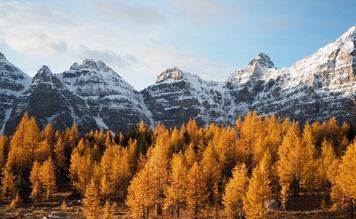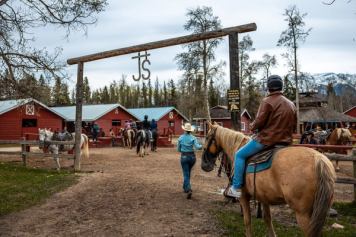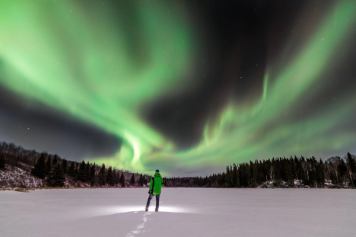2. Take time to connect
When Alex was sent to interview Cree dancer Patrick Mitsuing (pictured in the page banner) before his February Superbowl performance, the two were able to connect before getting down to business.
“We sat down for lunch and he opened up,” Alex says. “Simple gestures, like an invitation to connect over a meal, can allow a two-way conversation and a meaningful connection.”
In their Toolkit for working with ITA and its members, Indigenous Tourism Alberta recommends investing significant time in actively listening to communities and businesses to build meaningful, respectful relationships. “Through listening to and sharing stories we uncover not what makes us different, but reveal shared, cross-cultural values and human experiences.”
3. Self-educate
When advising media about working effectively with Indigenous tour operators, Lysandra from Indigenous Tourism Alberta recommends that writers research the history themselves, rather than asking an Indigenous Person to explain.
“Learn about the Indian Act, Treaties and Treaty responsibilities, Genocide of the Buffalo, Reservation systems, the Red and White paper,” she advises. “This will enrich your learning and create a safe space for the Indigenous operator to not have to explain these parts of history, which takes emotional energy for them.”
4. Acknowledge your relationship with the land
Acknowledgement of the land is a traditional custom of Indigenous people when welcoming outsiders onto their land and into their homes. To build respectful relationships, acknowledging the land is an important part of reconciliation.
Brenda Holder, owner of Mahikan Trails, enjoys seeing visitors personally relate to the land in her work as an Indigenous tour operator. “By teaching them these amazing resources that are found on the land, it draws a comparison between people and how they relate to the land in their own specific way as well," Brenda explains.
A land acknowledgement can be more than just a checkbox. Lysandra advises, “A land acknowledgement should come from a place of the heart and spirit. Don’t copy and paste. Do your homework. Be genuine and reflect, take your time.”
Adelle thinks about ways to make a land acknowledgement more personal, noting, “you can include where you came from and how you came to be on this land. That way it can be a way to check in with your own story and experience.”





